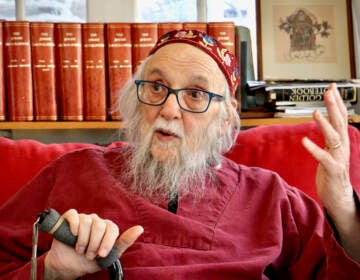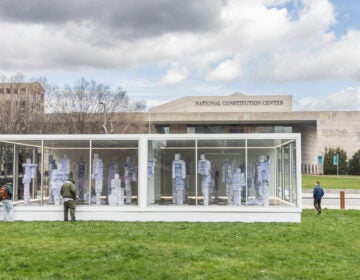Philly project for art and criminal justice to receive international award
For almost 10 years, the People’s Paper Co-op has used art to help women get out of jail, and to get people’s criminal records expunged.

Courtney Bowles explains how the People's Paper Co-op invites people who recently had their criminal records expunged to turn their old records into pulp, which is then made into new paper on which to write their future lives. (Peter Crimmins/WHYY)
The People’s Paper Co-op began in 2014 in North Philadelphia as an art workshop that would help people get their criminal records expunged.
It was supposed to last just five months. Now, nearly 10 years later, the initiative of The Village of Arts and Humanities is still going strong, currently helping bail women out of jail.
“We asked the question: What would a social service look like if it were designed by the people who need it the most?” said PPC co-founder Courtney Bowles. “In North Philly, the arrest rate is three times higher than the rest of the city and much higher than a lot of the country. A lot of folks have been impacted by the criminal legal system and wanted to address that.”
Bowles was speaking in the Cantor Fitzgerald Gallery of Haverford College, which is hosting “Let’s Get Free: The Transformative Art and Activism of the People’s Paper Co-op,” an exhibition about the work PPC has been doing for a decade.
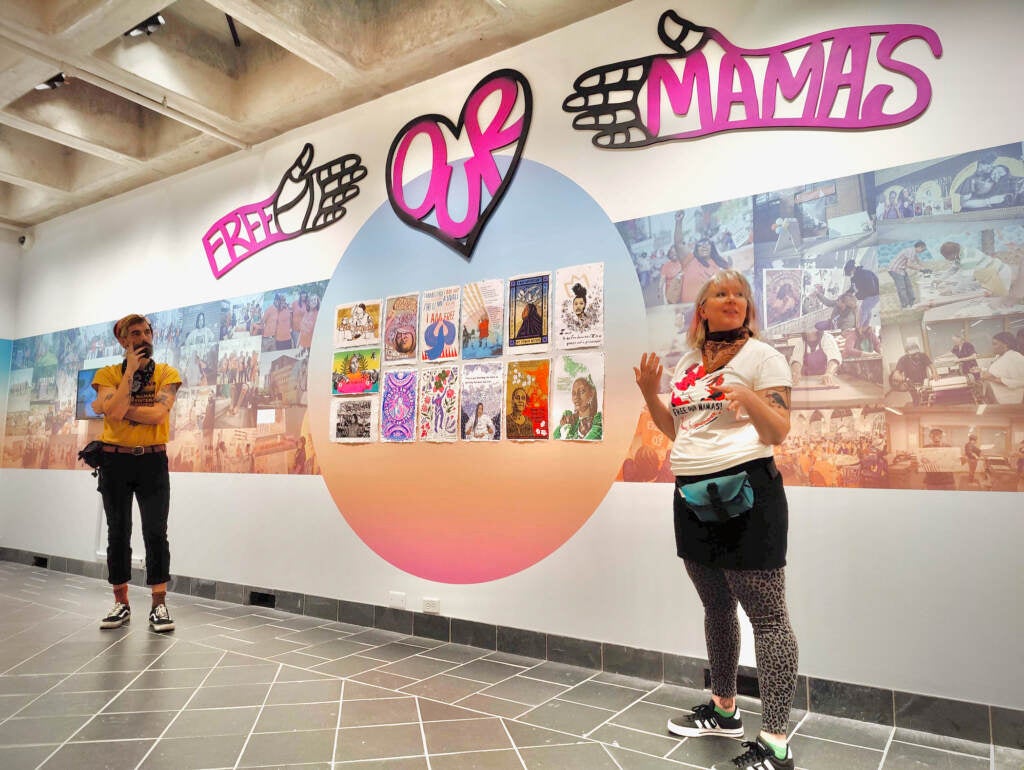
On Sunday, Bowles and fellow co-founder Mark Strandquist will travel to Houston’s Rothko Chapel, to receive the Óscar Romero Award, an international award given every other year honoring people and organizations engaged in social justice activism.
The award is named after the El Salvadoran Catholic archbishop who championed the poor and was critical of El Salvador’s authoritarian government in the 1970s. In 1980, Óscar Romero was assassinated while saying mass. In 2018, Pope Francis canonized him as a saint.
“As a person who is not a believer but has been inspired by and taught by so many radical people of faith, to get the Óscar Romero award is the highest compliment,” said Strandquist. “There’s no way we could do anything without the millions of collaborators and partners and friends and family that we’ve built along the way, but it’s beyond humbling.”

Past recipients of the award include Gérman Chirinos, a land and water rights activist in Honduras; Dr. Namegabe Murhabazi of the Democratic Republic of Congo for his work negotiating the release of children conscripted as soldiers in armed militias; and Oslobođenje, a Bosnian daily newspaper.
It’s not the first time PPC has been officially honored. In 2019, Philadelphia Mayor Jim Kenney issued a citation recognizing five formerly incarcerated women with the People’s Paper Co-op for their contribution to a report for the City’s Commission for Women.
Art is at the core of the PPC’s work supporting people impacted by the criminal justice system. The opening exhibit at “Let’s Get Free” features a wall of handmade paper sheets affixed with short handwritten notes and a polaroid picture of the author.
These sheets were made at expungement clinics held by PPC and partnering organizations, where people with criminal records can meet a table of pro-bono attorneys to get their records erased. After the legal process is done, the participants are invited to put their records in a blender to make what Strandquist calls a “paper smoothie.”
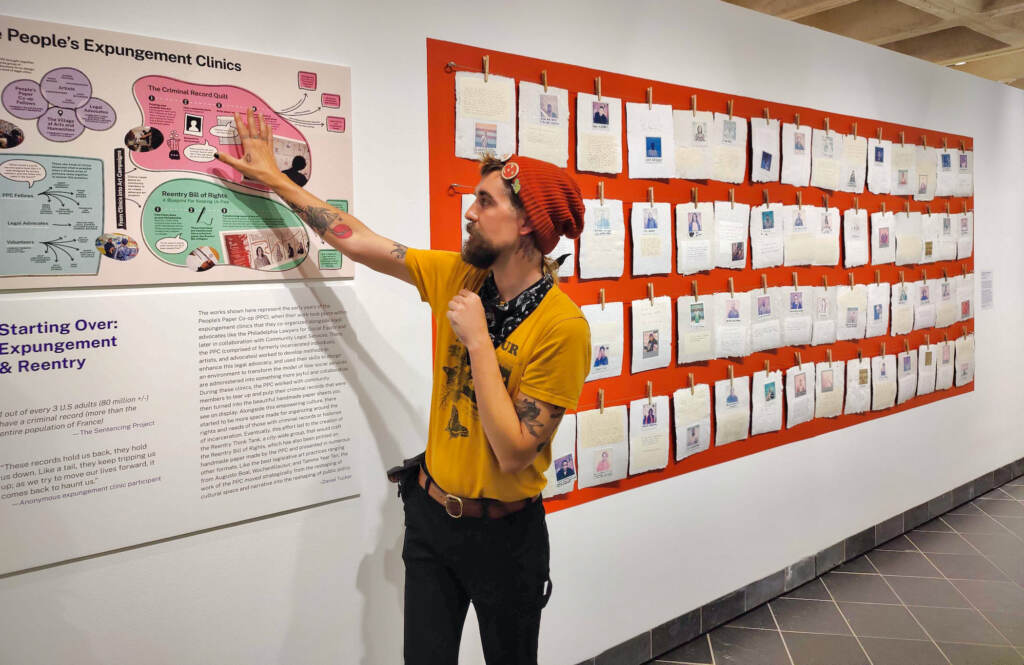
The wet pulp is then pressed into a screen and made into new paper, onto which a photograph– a kind of updated mugshot– is glued. The person is asked to write a few lines of what they imagine their future will be.
“The work we do is a way of dealing with the trauma of bringing up your criminal record, talking to a lawyer, revisiting your darkest days: ‘I see this mug shot. I see your record. You must be a bad person,’” said Bowles. “’It doesn’t show the beautiful mom or father or aspirational politician that you are. We wanted to create a space for people to transform and heal through art.”

The PPC also has a project to raise bail money for women in jail. Recently released women are paired with an illustrator to create images with text that express their visions of themselves, which are then sold as posters, t-shirts, bags, etc. Strandquist said, so far, the program has raised more than $200,000 for the Philadelphia Community Bail Fund. The fund advocates for an end to cash bail and every year attempts to get as many Black women out of jail as possible in time for Mother’s Day.
The PPC has just started working with a new cohort of recently released women, who will determine how best to assist others like themselves who are still detained.
“There is a long history of artists or politicians or advocates speaking for communities,” said Strandquist. “We really wanted to do this work in a way that we feel is not only more powerful and effective, but also equitable.”
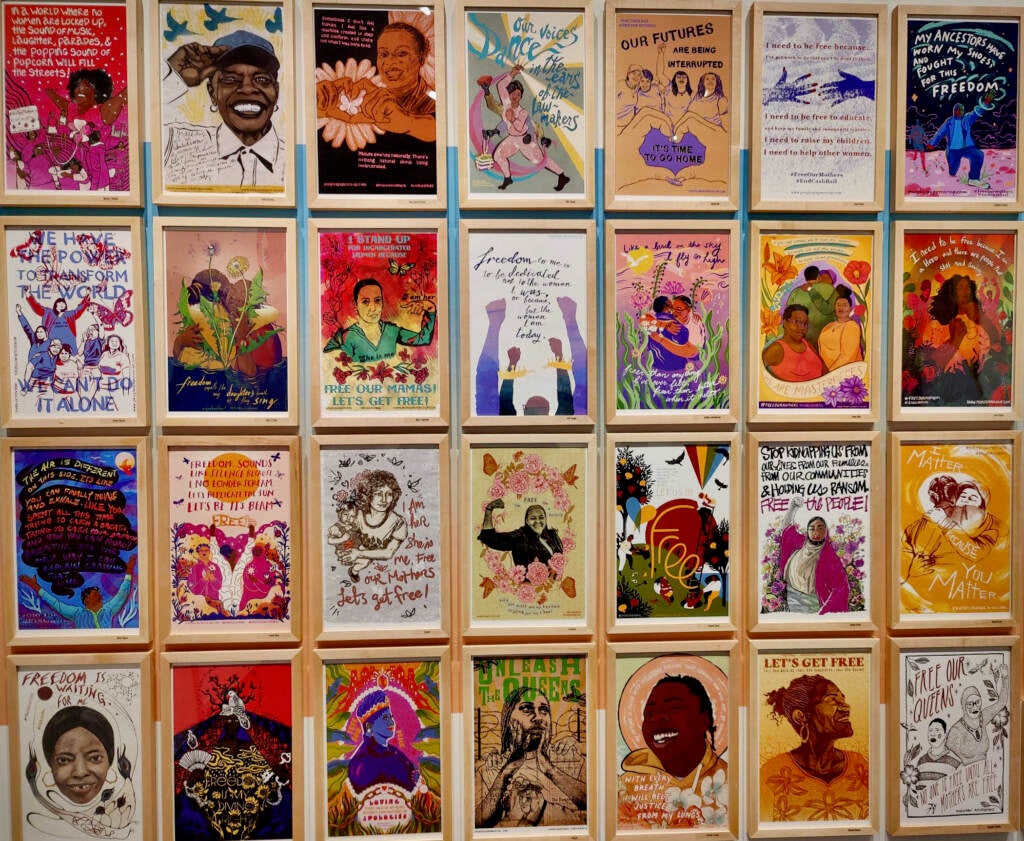
The exhibition at Haverford includes flowcharts identifying all the groups and artists the PPC has partnered with to do the work. Strandquist hopes the exhibition can be seen as a model for how arts can be effectively integrated into civic and social programs.
“So that other people can see this in other cities and say: ‘Of course you wouldn’t do a project about people without them,’” said Stransquist. “Of course you wouldn’t not bring arts in, because it’s so healing and transformative and opens up possibilities.”
Haverford’s Hurford Center for Arts and Humanities is in the midst of thematic programming for the academic year around issues of criminal justice, including “Let’s Be Free.” Once the exhibition closes on April 21, the curatorial work will not be lost. Strandquist plans to repurpose the exhibition materials as a book about the history and methodologies of the People’s Paper Co-op.

Get daily updates from WHYY News!
WHYY is your source for fact-based, in-depth journalism and information. As a nonprofit organization, we rely on financial support from readers like you. Please give today.



